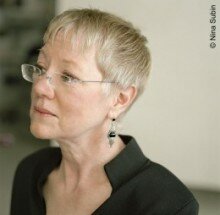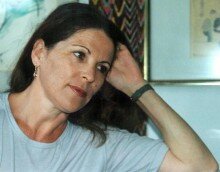
Linda Gregerson is the author of several collections of poetry and literary criticism. A Renaissance scholar, a classically trained actor, and a devotee of the sciences, Gregerson produces lyrical poems informed by her expansive reading that are inquisitive, unflinching and tender. Tracing the connections she finds between science and poetry, Gregerson says, in an interview with David Baker of the Kenyon Review, “I think there are rhythms of thought, fragile propositions about the intersections of human understanding and human habitus, robust intersections of the pragmatic and the sublime, that science shares with art, and I love the thought that poetry can learn from and do homage to its near cousins. The great thing about ‘facts’ (and the scientists are much more sophisticated skeptics than the poets are) is that they put up resistance. Resistance is good for art, and for thinking in general.”
As a reviewer for the New Yorker noted, “Gregerson’s rich aesthetic allows her best poems to resonate metaphysically”. After her first collection, Fire in the Conservatory (1982), frustrated by the way her left-justified block stanzas seemed to stifle the syntactical leaps in her poetry, Gregerson created a specialised, sinuous tercet form in which she worked for nearly 20 years:
in what sense can the window
still be said
to govern point of view? Nostalgia? Backward
longing not so much for death-by-proxy as
for that
which makes the dying incidental. Hence
our beggarly rapture at stark divides: the cliffs
on one side, North
Sea on the other, and the mutilated
body (there is nothing quite so good at this)
for scale.
(from ‘Half Light’)
Of the form’s advantages, Gregerson notes, “the tercets were the first formal vehicle I found that seemed to me to be properly flexible, and true. Especially important was that second, deeply indented line, the ‘pivot line’ as I conceived it, often only a single metrical foot long. It gave me a kind of skeletal resistance, something that syntax could work against, and thus it became a true generative proposition, not just a kind of packaging. The lineation produced the poem.” With Magnetic North (2007), Gregerson moved on from the tercet to other modes of formal experimentation.
And what should you see (still
sleeping) as you look for the source of the sound?
Our father on the mower making
modest assault
on the ever-inadequate-hours-of-the-day, as
manifest in your neglected
lawn. Fed up, no doubt. Confirmed
in his private opinions. But
knightly in his fashion and—it's this
I want to make you see—
in heaven to be called upon.
(from ‘My Father Comes Back from the Grave’)
Magnetic North was a National Book Award finalist, and Waterborne (2002) won the Kingsley Tufts Award. Gregerson’s other awards include the American Academy of Arts and Letters Award in Literature, the Consuelo Ford Award from the Poetry Society of America, three Pushcart Prizes, and the Levinson Prize from Poetry magazine. She has also received fellowships from the Guggenheim Foundation, the Mellon Foundation, the Rockefeller Foundation Bellagio Center, the Institute for Advanced Study, the National Humanities Center, and the National Endowment for the Arts.
Gregerson holds degrees from Oberlin College, Northwestern University, the University of Iowa Writers’ Workshop and Stanford University. She has taught at the University of Michigan and the Warren Wilson low-residency MFA program.
Bibliography
Poetry
Magnetic North, Houghton Mifflin, Boston, MA, 2007
Waterborne, Houghton Mifflin, Boston, MA, 2002
The Woman Who Died in Her Sleep, Houghton Mifflin, Boston, MA, 1996
Fire in the Conservatory, Dragon Gate, Port Townsend, WA, 1982
Literary criticism
Negative Capability: Contemporary American Poetry, University of Michigan Press, Ann Arbor, MI, 2001
The Reformation of the Subject: Spenser, Milton, and the English Protestant Epic, Cambridge University Press, Cambridge, 1995
Links
Kenyon Review: Linda Gregerson interviewed by David Baker
Memorious 13: Linda Gregerson interviewed by Adam Day
Audio recording of ‘Eyes Like Leeks’
audio recording of ‘The Horses Run Back to Their Stalls’
Poetry magazine: podcast featuring Linda Gregerson
Slate magazine: ‘At the Window’, with audio









